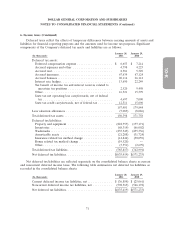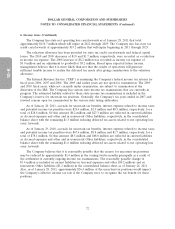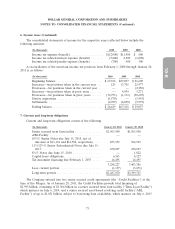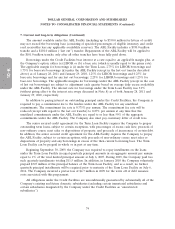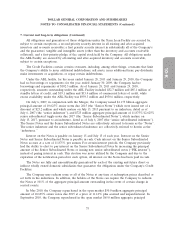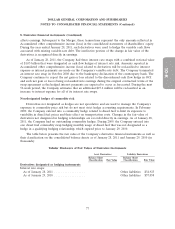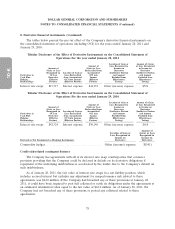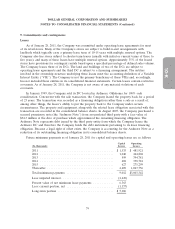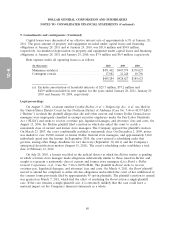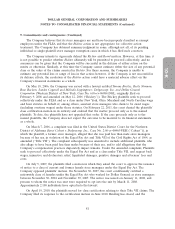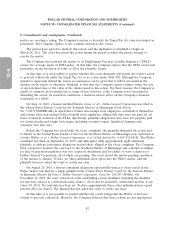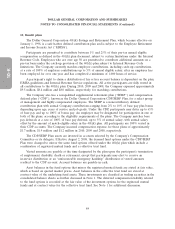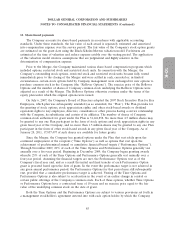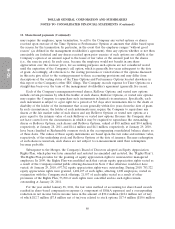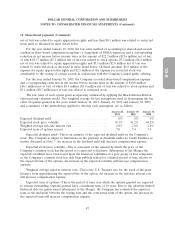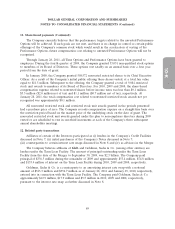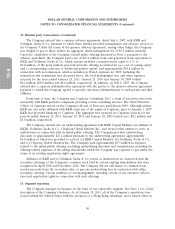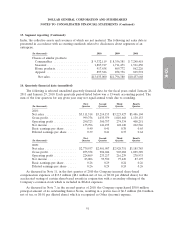Dollar General 2010 Annual Report Download - page 159
Download and view the complete annual report
Please find page 159 of the 2010 Dollar General annual report below. You can navigate through the pages in the report by either clicking on the pages listed below, or by using the keyword search tool below to find specific information within the annual report.
10-K
DOLLAR GENERAL CORPORATION AND SUBSIDIARIES
NOTES TO CONSOLIDATED FINANCIAL STATEMENTS (Continued)
9. Commitments and contingencies (Continued)
The Company believes that its store managers are and have been properly classified as exempt
employees under the FLSA and that the Richter action is not appropriate for collective action
treatment. The Company has obtained summary judgment in some, although not all, of its pending
individual or single-plaintiff store manager exemption cases in which it has filed such a motion.
The Company intends to vigorously defend the Richter and Beard matters. However, at this time, it
is not possible to predict whether Richter ultimately will be permitted to proceed collectively, and no
assurances can be given that the Company will be successful in the defense of either action on the
merits or otherwise. Similarly, at this time the Company cannot estimate either the size of any potential
class or the value of the claims asserted in Richter. For these reasons, the Company is unable to
estimate any potential loss or range of loss in that action; however, if the Company is not successful in
its defense efforts, the resolution of the Richter action could have a material adverse effect on the
Company’s financial statements as a whole.
On May 18, 2006, the Company was served with a lawsuit entitled Tammy Brickey, Becky Norman,
Rose Rochow, Sandra Cogswell and Melinda Sappington v. Dolgencorp, Inc. and Dollar General
Corporation (Western District of New York, Case No. 6:06-cv-06084-DGL, originally filed on
February 9, 2006 and amended on May 12, 2006 (‘‘Brickey’’)). The Brickey plaintiffs seek to proceed
collectively under the FLSA and as a class under New York, Ohio, Maryland and North Carolina wage
and hour statutes on behalf of, among others, assistant store managers who claim to be owed wages
(including overtime wages) under those statutes. On February 22, 2011, the court denied the plaintiffs’
class certification motion in its entirety and ordered that the matter proceed only as to the named
plaintiffs. To date, the plaintiffs have not appealed that order. If the case proceeds only as to the
named plaintiffs, the Company does not expect the outcome to be material to its financial statements
as a whole.
On March 7, 2006, a complaint was filed in the United States District Court for the Northern
District of Alabama (Janet Calvert v. Dolgencorp, Inc., Case No. 2:06-cv-00465-VEH (‘‘Calvert’’)), in
which the plaintiff, a former store manager, alleged that she was paid less than male store managers
because of her sex, in violation of the Equal Pay Act and Title VII of the Civil Rights Act of 1964, as
amended (‘‘Title VII’’). The complaint subsequently was amended to include additional plaintiffs, who
also allege to have been paid less than males because of their sex, and to add allegations that the
Company’s compensation practices disparately impact females. Under the amended complaint, Plaintiffs
seek to proceed collectively under the Equal Pay Act and as a class under Title VII, and request back
wages, injunctive and declaratory relief, liquidated damages, punitive damages and attorneys’ fees and
costs.
On July 9, 2007, the plaintiffs filed a motion in which they asked the court to approve the issuance
of notice to a class of current and former female store managers under the Equal Pay Act. The
Company opposed plaintiffs’ motion. On November 30, 2007, the court conditionally certified a
nationwide class of females under the Equal Pay Act who worked for Dollar General as store managers
between November 30, 2004 and November 30, 2007. The notice was issued on January 11, 2008, and
persons to whom the notice was sent were required to opt into the suit by March 11, 2008.
Approximately 2,100 individuals have opted into the lawsuit.
On April 19, 2010, the plaintiffs moved for class certification relating to their Title VII claims. The
Company filed its response to the certification motion in June 2010. Briefing has closed, and the
81


